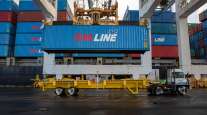Senior Reporter
Oregon Legislature Advances 10-Year, $5.3 Billion Transportation Funding Package

Lawmakers in Oregon approved a $5.3 billion measure in July that would increase taxes and fees to pay for freight, transit and commuter infrastructure projects.
The bipartisan measure cleared by the state Senate on July 6 awaits the signature of Gov. Kate Brown (D). The governor, who indicated she would sign the bill into law, has called for upgrades to highways and bridges throughout her administration, and the legislation marks a significant victory for infrastructure proponents.
Aside from boosting connectivity, Brown explained that measures in the bill would ensure new infrastructure projects are able to withstand catastrophic weather events that experts have linked to climate change. She also touted the measure’s proposed upgrades of public transit projects, rural roads, and bicycle and walking paths statewide. She estimated the projects overall have the potential of adding more than 16,000 jobs in the construction sector.
“It is absolutely imperative that we invest in ensuring that our road system is resilient and is preserved for the future, for future generations,” Brown said in a July 12 interview with Oregon Public Broadcasting. “We want to make sure that we invest in our roads and bridges in a way that makes sense for Oregon.”
Specifically under the bill, the state’s motor vehicle fuel tax would go up 4 cents per gallon as of Jan. 1. The tax would continue to increase 2 cents in 2020, 2022 and 2024 for an ultimate increase of 10 cents per gallon.
The increases will move forward, “provided that the Oregon Transportation Commission certifies that certain conditions have been met,” according to the bill. The legislation also would increase the vehicle registration fee and the fee in the weight per mile system for trucks. The weight fee would shift to an estimated $25.12 cents per mile by 2025 from the current $16.38 cents per mile, according to background the legislation’s drafters provided.
The bill also would establish collection procedures for excise taxes. It would prohibit local governments from imposing taxes on the sale of taxable motor vehicles unless authorized by statute or approved by a governing body on or before the bill’s enactment into law, an analysis accompanying the legislation noted.
The bill also includes “congestion pricing” that would raise revenue via tolls along interstates 205 and 5 for freeway improvement projects. That provision would require federal approval, said Rep. Cliff Bentz (R), co-vice chairman of the joint committee in the Legislature that drafted the bill.
Bentz stressed that the support for advancing a long-term, dynamic transportation measure came about after 15 county commissioners “from my five counties, the mayors from the largest cities in my district, and the constituents that attended transportation meetings I arranged last year unanimously [asked] that I do something to help.”
“You listen, and then you design a bill that balances accountability, need and due recognition of people’s ability to pay,” he said, adding, “I am pleased that we were able to include in the bill protection against the most dangerous impacts of the low carbon fuel standard, along with specific freight and road improvements, which will directly benefit eastern Oregon.”
Roads in poor condition cost every driver in Oregon about $285 annually, which includes auto repairs such as front-end alignments, according to an analysis by the American Society of Civil Engineers. Nearly 6% of bridges are rated structurally deficient, meaning they require significant repairs, and 77 dams have a high-hazard potential, the engineers found.
“This deteriorating infrastructure impedes Oregon’s ability to compete in an increasingly global marketplace. Success in a 21st century economy requires serious, sustained leadership on infrastructure investment at all levels of government,” ASCE emphasized this year in a report about the Beaver State. “Delaying these investments only escalates the cost and risks of an aging infrastructure system, an option that the country, Oregon and families can no longer afford.”




